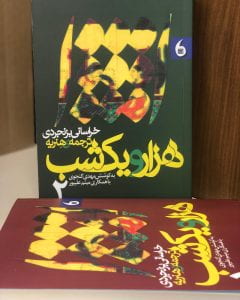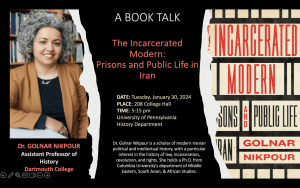Events
Katz Center Thirtieth Anniversary Concert

The Music of Resilience: Songs of Jewish Survival East and West
Sunday, April 14, 3:00 PM
American Philosophical Society
Benjamin Franklin Hall
427 Chestnut Street, Philadelphia
Free and open to the public, registration required
To mark its thirtieth birthday, the Katz Center presents a concert exploring Jewish musical culture from different parts of the world, East and West. This sonic tribute to Jewish survival and cultural vitality features songs nearly lost to memory but now brought to life by extraordinary musical scholars.
Act I: Yiddish Glory
Lost and Found Songs of Soviet Jews during World War II
Featuring Anna Shternshis and Psoy Korolenko
Grammy-nominated singer-songwriter Psoy Korolenko (Dartmouth College) and historian Anna Shternshis (University of Toronto) bring to life long lost Yiddish songs of World War II in this all-new concert and lecture program. Collected by Moisei Beregovsky and other scientists of the Kiev Cabinet for Jewish Culture, these Yiddish songs were confiscated and hidden by the Soviet government in 1949, and have only recently come to light. They tell stories of how Soviet Jews lived and died under the German occupation, used music to document Nazi atrocities, fought in the Red Army, worked on the home front, and made sense of it all through Yiddish music. None of these songs were known until they were accidentally discovered in the basement of the Ukrainian National Library in the 1990s. The performance of these materials gives voice to Soviet Jewish women, children, and men who never got to tell their stories but left us their incredible songs.
Act II: Monajat
An Intergenerational Remix of Persian Jewish Songs
Featuring Galeet Dardashti with Shanir Blumenkranz, Philip Mayer, Zafer Tawil, and Max ZT
Galeet Dardashti’s multi-sensory project and album, Monajat, is inspired by old and haunting recordings of Jewish prayers chanted by her late grandfather, Younes Dardashti, a famous master singer of Persian classical music in 1950s/60s Iran. Galeet reinvents the ancient ritual of Selihot by singing with remixed samples of her grandfather’s legacy recordings. Riffing on these old tapes, Galeet composes a soundscape of original music performed by an ensemble of acclaimed Middle Eastern and jazz musicians. Dynamic video art created by artist/designer Dmitry Kemell envelopes the audience, bringing listeners into the ritual. This powerful project is both deeply Jewish and deeply Persian at a time of tremendous antisemitism and Islamophobia.
Nowruz Celebration

Nowruz (Nawruz) is often translated simply as “Persian” or “Iranian” New Year, but it is celebrated from the Uyghur regions of Western China all across Central Asia through to Iran and beyond, including parts of Russia, Afghanistan, and broader South Asia.
The holiday marks the spring equinox, on or around March 21st of each year.
Come join us in celebrating the arrival of spring with Central Asian food! There will be a Haft Sin as well as presentations about Uyghur, Kazakh, and Persian Nowruz traditions by David Dettmann (Center for East Asian Studies), Zhanar Beketova (Penn Language Center), and Mahyar Entezari (Near Eastern Languages and Civilizations).
Food will be served at sundown.
The Henriyah Translation: The Earliest Persian Translation of the 1001 Nights
Talk by Mahdi Ganjavi

In this presentation, Mahdi Ganjavi will historicize and explore the lesser known Henriyah Translation (tarjumah hinrīyah), the earliest translation of the 1001 Nights into Persian. Patronized by Henry Russell, 2nd Baronet (1783–1852), British Resident in Hyderabad, Muhammad Baqir Khurasani Buzanjirdi (b.1770) finalized his translation in 1814 almost three decades before Abdul Latif Tasuji embarks on a similar project in Iran. Overlooked by historians of literature, Henriyah Translation happens to be not only the earliest Persian translation, but one which is based on a significantly older family of Alf Layla Wa-Layla Arabic manuscripts. Through manuscript and archival study, and textual analysis of the two manuscripts available from this translation, this presentation will narrate an interregional story that remained hidden for two centuries about Nights in Persian.
Mahdi Ganjavi is a distinguished historian specializing in education, literature, print, and translation within the Middle East and a well-established editor of Persian manuscripts. Mahdi Ganjavi holds a PhD from the Department of Leadership, Higher and Adult Education at the University of Toronto. A former postdoctoral fellow at the School of Education and Social Policy at Northwestern University, he currently teaches at the Faculty of Information at the University of Toronto. His research focuses on the transnational history of books, print, translation, and education. In the last seven years, he edited and oversaw the publication of six little-known Persian novels from the 1920s-1940s. These novels shed light on the origins of historical and utopian fiction, science fiction and detective fiction in Persian.
He has recently finalized the first critical edition of Henriyah Translation (tarjumah hinrīyah), the earliest Persian translation of “One Thousand and One Nights” (Maniahonar, 2022), based on two manuscripts of this translation. One is included in the Sir Edward Henry Whinfield Collection, which was bequeathed to the Indian Institute, Oxford, in 1922, and later transferred to the Bodleian Library. The second copy of Henriyah Translation is held at Houghton Library, Harvard University (MS Persian 11). Its former owner had been Mary Pratt, who gifted it to Harvard College along with another 59 manuscripts of his brother, Herbert J. Pratt, back in 1915, a few months after the passing of Herbert.
The Incarcerated Modern: Prisons and Public Life in Iran

Revolution of Things: The Islamism and Post-Islamism of Objects in Tehran

Woman, Life, Freedom: A Global Gender Protest

